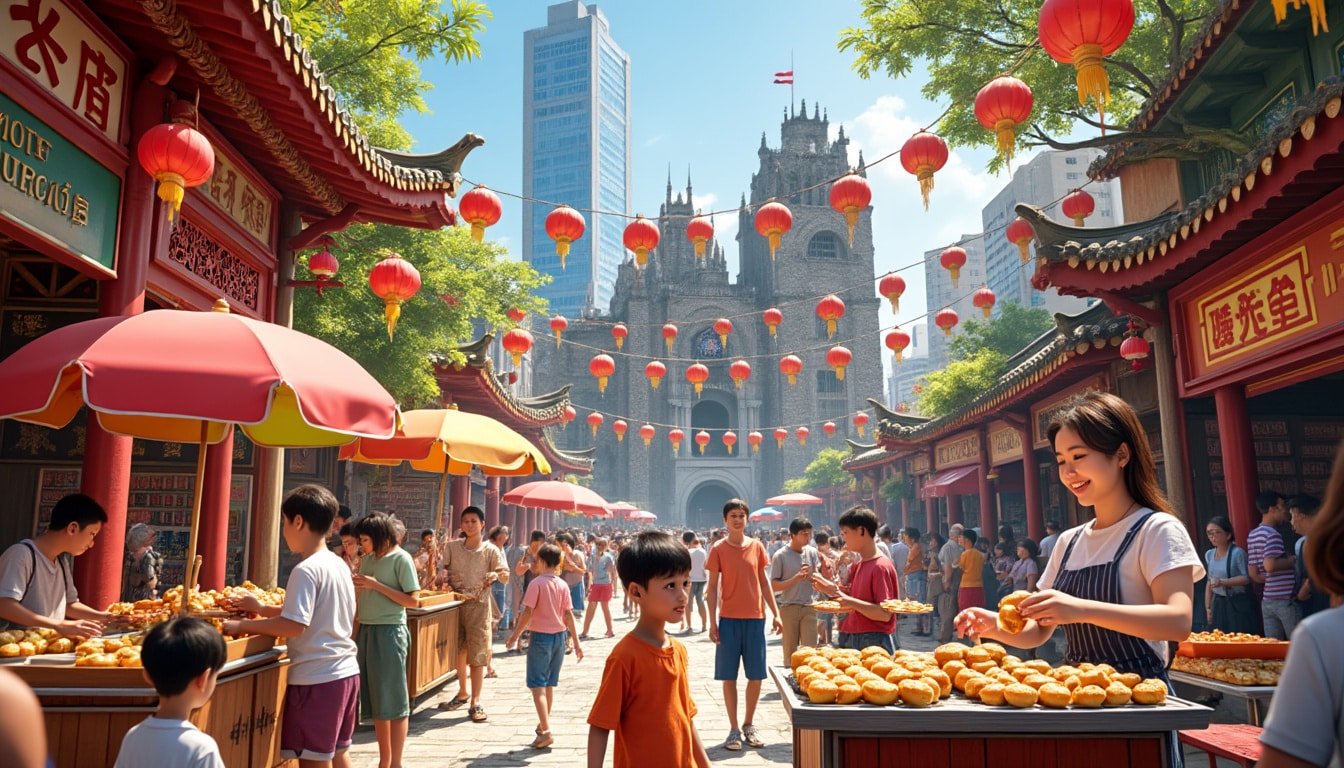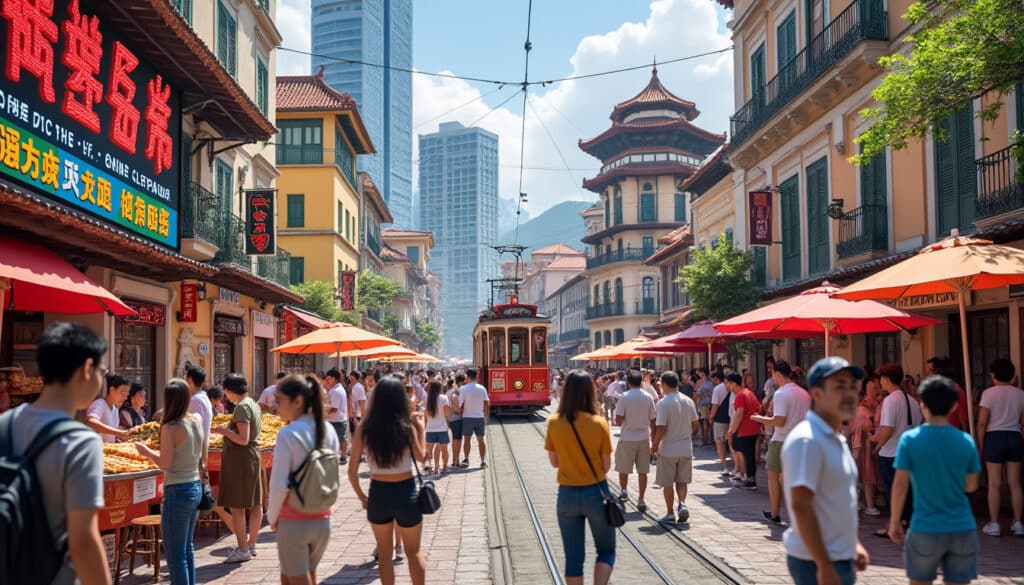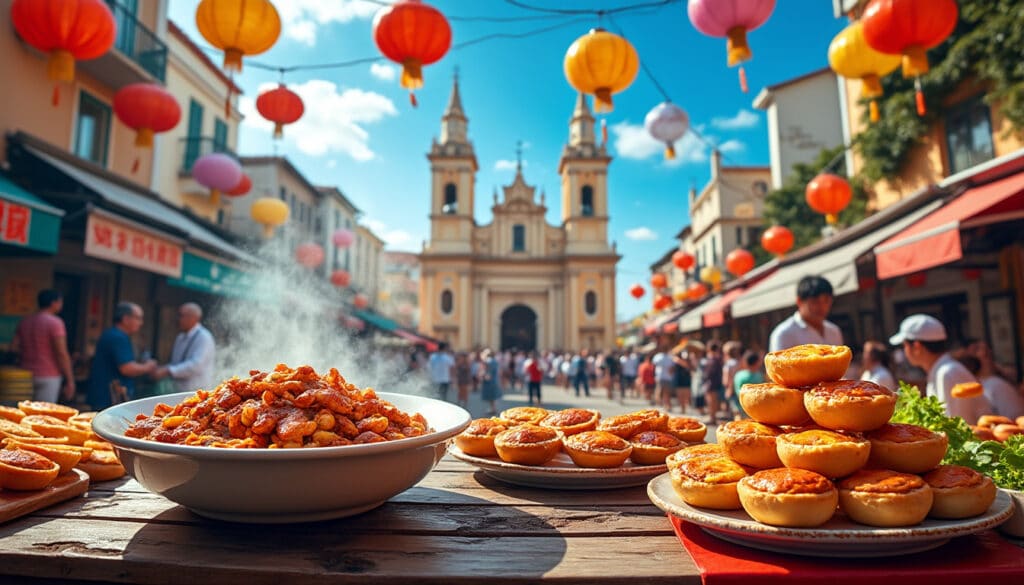Macau, a vibrant and diverse destination, stands as a unique blend of cultures and traditions. As one of Asia’s most dynamic regions, Macau offers an exquisite tapestry of Portuguese and Chinese influences that reflect its rich history. From bustling festivals to quiet corners showcasing centuries-old heritage, Macau beckons visitors to explore its traditions and way of life. With a myriad of cultural experiences, the local life here promises a journey that enriches the soul and mind.
The Blend of Cultures: Portuguese and Chinese Heritage in Macau
Macau’s cultural landscape is a fascinating blend of Portuguese and Chinese influences, a legacy of its history as a Portuguese territory. This amalgamation is pervasive in every aspect of life, from architecture to cuisine. The juxtaposition of European flair and Eastern traditions can be vividly observed at locations like the A-Ma Temple, a place of worship with distinct Chinese architectural features, juxtaposed against historical sites such as the Ruins of St. Paul’s, where the remnants of a 17th-century Portuguese church stand.
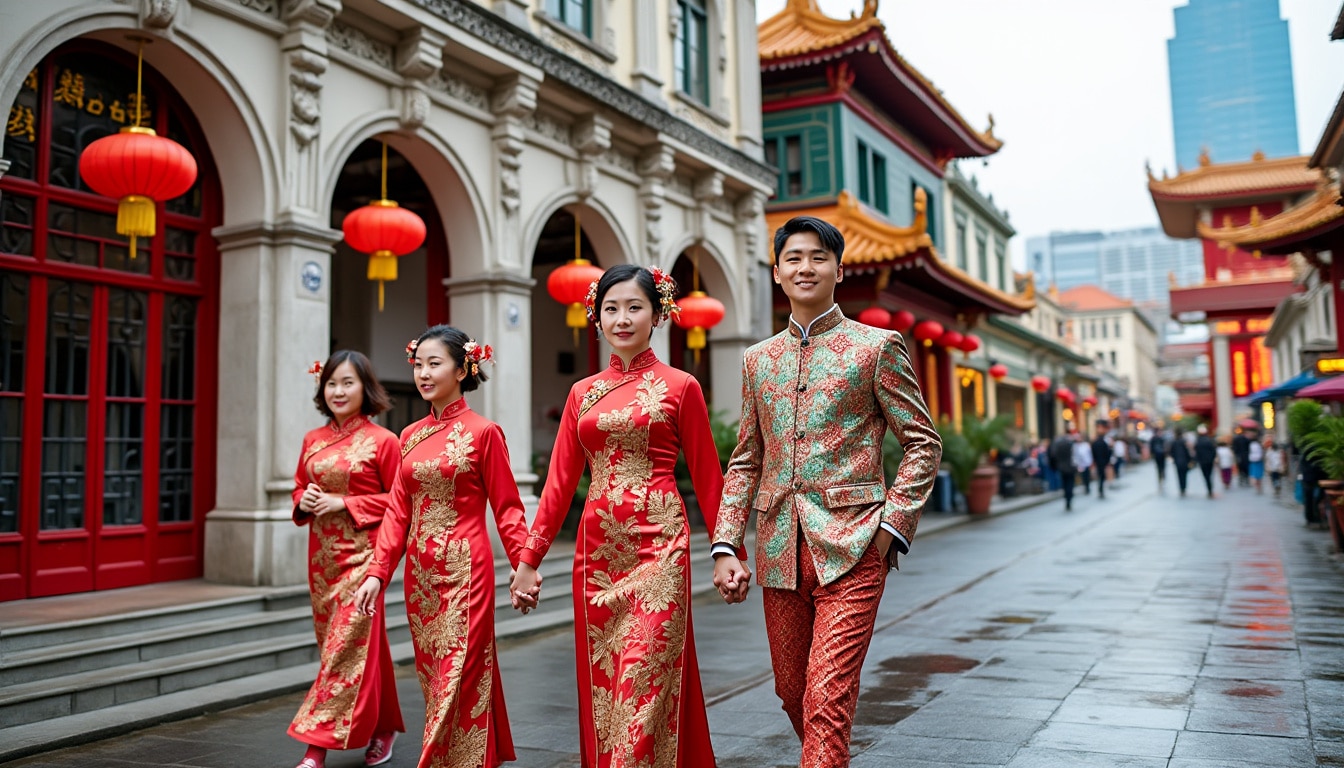
The Macao Cultural Centre often showcases performances that highlight this unique merger. Here, local acts, including traditional Patuá theatre and Cantonese opera, illustrate the intertwining of these cultures. Such performances are not only artistic displays but also cultural preservations that remind the audience of Macau’s distinct identity. Furthermore, the Macao Arts Festival regularly features a lineup that spans both traditional Chinese arts and contemporary Portuguese influences, offering a comprehensive look into Macau’s cultural vibrancy.
Beyond architecture and arts, Macau’s culinary scene also tells the story of its multicultural roots. The Macau Food Festival is a celebration of the region’s gastronomic diversity, where visitors can savor traditional Macanese dishes that are a fusion of Portuguese, Chinese, and even African flavors. The iconic Portuguese egg tart, alongside time-honored dishes such as Minchi, reflects a culinary culture as rich and varied as the city itself.
Macau’s streets are a living history, where traditional Chinese festivities like the Lunar New Year are celebrated with dragon and lion dances, co-existing harmoniously with Portuguese traditions such as the Catholic Processions. Notably, festivals like the Macau International Fireworks Display Contest bridge these cultural gaps, where the skies over Macau are illuminated, representing the union of diverse traditions.
The integration of these two cultures in Macau is a testament to the region’s historical evolution. As a hub for trade during the 16th century, Macau attracted settlers from various parts of the world. This cultural interchange has given rise to a unique societal fabric that continues to define life in Macau today. Whether it’s through art, cuisine, or festivities, the Portuguese and Chinese heritage remains a cornerstone of Macau’s identity, making it a compelling destination for cultural exploration.
Artistic Expressions and Traditional Performances
In Macau, the performing arts are a vital component of cultural life. Traditional performances such as the Lion Dance and the Dragon Dance are regularly showcased during festivals and significant cultural events, symbolizing good fortune and dispelling evil spirits. These dances, with their vibrant costumes and rhythmic drumming, are a spectacle not to be missed. The Macau Heritage Walks often include such festivities, presenting an opportunity to engage with local tradition firsthand.
- 🎭 Yueju Opera: Known for its extravagant make-up and costumes, this Cantonese opera narrates tales of love and valor.
- 🎵 Cantonese Naamyam: These narrative songs tell long-form stories, often performed by seasoned singers.
- 🥁 Baatyam Percussion: A part of traditional quyi, combining Cantonese opera songs with a mix of Chinese instruments.
On the other hand, the Macao Science Center frequently hosts exhibitions that delve into the scientific significance of these cultural practices, exploring the physics behind these captivating performances. It’s in places like these that visitors are reminded of the profound impact of traditional art forms on Macao’s cultural landscape.
Significantly, Patuá theatre, a unique theatrical form performed in the Creole language of Patuá, reflects the linguistic mélange of Macau’s past. Through its comedic narratives and satirical twists, it is revered as a cultural treasure, connecting the past to the present. Such performances offer not merely entertainment but a deeper understanding of Macau’s societal evolution.
Festivals as a Window to Macau’s Soul
Festivals in Macau are a vibrant showcase of the region’s cultural diversity and communal spirit. Each event is a celebration, reflecting the city’s rich tapestry of traditions and beliefs. Among the most vibrant is the Festival of the Drunken Dragon, where fishmongers perform traditional dragon dances under the haze of rice wine, parading through the city’s streets.
The Macao Museum is another venue that frequently hosts exhibitions synchronizing with these festivities, offering historical insights into their significance and evolution. This intertwining of culture and education provides an enriching experience for both locals and tourists, making the museum a must-visit during festival seasons.
Equally enchanting is the Lantern Festival, often celebrated on the 15th day of the first lunar month. During this time, streets and parks are adorned with eye-catching lanterns, creating a mesmerizing atmosphere. Young hearts gather to solve lantern riddles, while families revel in the festive ambiance.
The processions, such as the Procession of Our Lady of Fatima, a blend of religious devotion and traditional celebration, highlight the city’s unique narrative. These events bring the community together, transcending generational and cultural boundaries. The spectacle of the Macau International Fireworks Display Contest further amplifies this, uniting diverse audiences under the blanket of Macau’s starry skies.
Embedded within these celebrations is the resilience of Macau’s identity, a reflection of a society that cherishes its past while embracing the future. Festivals offer a profound insight into the daily life of Macau, revealing a community enriched by tradition yet open to change.
Craftsmanship and Intangible Cultural Heritage
Macau’s commitment to preserving its intangible cultural heritage is evident in its thriving traditional craftsmanship. The Cultural Affairs Bureau actively supports various arts, ensuring that traditional skills such as bamboo scaffolding and the manufacture of Portuguese tiles continue to flourish. These crafts not only highlight Macau’s aesthetic heritage but also the ingenuity and adaptability of its people.
With traditions dating back over centuries, many of these crafts are incorporated into everyday life as well as artistic forms. The House of Dancing Water, for instance, leverages such traditional skills, employing expansive stages made from bamboo scaffolding, a testament to the blend of traditional craftsmanship with contemporary performance art.
- 👘 Cheongsam Making: Intricate tailoring of this traditional dress remains a cherished art form.
- 🍽️ Macanese Gastronomy: A fusion of spices and culinary traditions from regions far and wide.
- 🧧 Dragonbeard Candy Making: A traditional confectionary craft with roots in ancient China.
Similarly, workshops and exhibitions at the Macau Museum often highlight the intricate processes behind these crafts, providing a deeper understanding of their cultural significance and contemporary relevance. Here, visitors are invited not only to witness these traditional practices but to participate in hands-on experiences, bridging the past and present.
Weather and Festivals: An Unconventional Dance
The subtropical climate of Macau plays a pivotal role in the timing and celebration of its festivals. Warm weather and moderate humidity are common, ensuring that festivals are enjoyed without weather-related hindrances. For those curious about the best times to visit for festival celebrations, resources like Macau Weather Monthly provide in-depth insights.
These climatic conditions influence not only festival timings but also the attire, food, and overall atmosphere. During cooler months, festivals like the Feast of Saint John, infamous for its historic celebration of victory, are celebrated with warmth and traditional delights. Meanwhile, in summer, festivities such as dragon boat races and the Qixi Festival thrive in the open air, basking in Macau’s sunny embrace.
Remarkably, stormy seasons bring their unique flavor, as the community navigates unpredictable weather with festivals like the Lantern Festival, held regardless of drizzle or shine. Such resilience highlights Macau’s unwavering spirit and commitment to tradition, regardless of natural challenges.
The interplay between weather and culture adds another layer of intrigue to Macau’s festivals, offering experiences as varied and dynamic as the seasons themselves. Whether you find yourself captivated by the dazzling displays or savoring the seasonal delicacies, the weather-enhanced atmosphere promises an unforgettable journey through time and tradition.
Local Life: Customs and Daily Practices
Daily life in Macau is a rich tapestry woven with customs and practices inherited across generations. The streets of Macau bear witness to routines that echo its history and celebrate its present. From early morning Tai Chi sessions in public parks to the vibrant sounds of local markets, Macau offers a glimpse into a life steeped in tradition.
The influence of Taoism, Buddhism, and Christianity permeates the city, marking its cultural landscape with spiritual diversity. Local rituals, such as the Worship of Ancestors during Cheng Ming, are respected and observed, showcasing the deep reverence for forebears. Such practices are not mere ceremonies but a reflection of Macau’s connection to its roots.
- 🧘 Tai Chi Practices: Morning routines that promote wellbeing and harmony.
- 📿 Religious Processions: Spiritual journeys that define the city’s cultural calendar.
- ⛩️ Taoist Celebrations: Festivals that mark seasonal cycles and pay homage to gods.
Furthermore, the vibrant nightlife mirrors Macau’s dynamic character, from bustling street food stalls to high-stakes casinos, each contributing to the city’s economy and culture. Renowned sites such as seasonal attractions, enhance the allure, welcoming visitors to experience local life through a cultural lens.
Future of Tradition: Embracing Evolution
As Macau progresses into 2025, its cultural landscape continues to evolve, balancing the preservation of tradition with the embrace of innovation. Integrated projects and festivals aim to echo this synergy, safeguarding the treasures of the past while adapting to contemporary influences. This vision extends to educational initiatives at institutions like the Macau Science Center, where technology meets tradition.
The government and local organizations are keen on preserving Macau’s heritage, with ongoing efforts to document and maintain intangible cultural practices. Collaborations with international cultural bodies have become a vital part of this mission, fostering a global appreciation of Macau’s uniqueness.
The introduction of digital platforms offers a new frontier for showcasing cultural content, enabling broader access and engagement. Projects like virtual tours of historical sites or live-streamed festivals allow global audiences to connect with Macau’s culture, transcending physical boundaries.
Overall, the future of Macau’s tradition is bright, with a commitment to maintaining its cultural integrity while fostering growth and modernity. Emphasizing the timeless charm and spirit that defines Macau, this journey promises to enrich both its residents and visitors alike.
FAQ: Understanding Macau’s Cultural Fabric
- What makes Macau’s cultural landscape unique?
- Which festivals are must-see events in Macau?
- How is tradition preserved in modern Macau?

🌟 Macau, a vibrant blend of Portuguese and Chinese influences, offers an unparalleled culinary experience. From street food vendors to exquisite fine dining, the city is a bonanza for food lovers around the world. Whether it’s indulging in the rich…
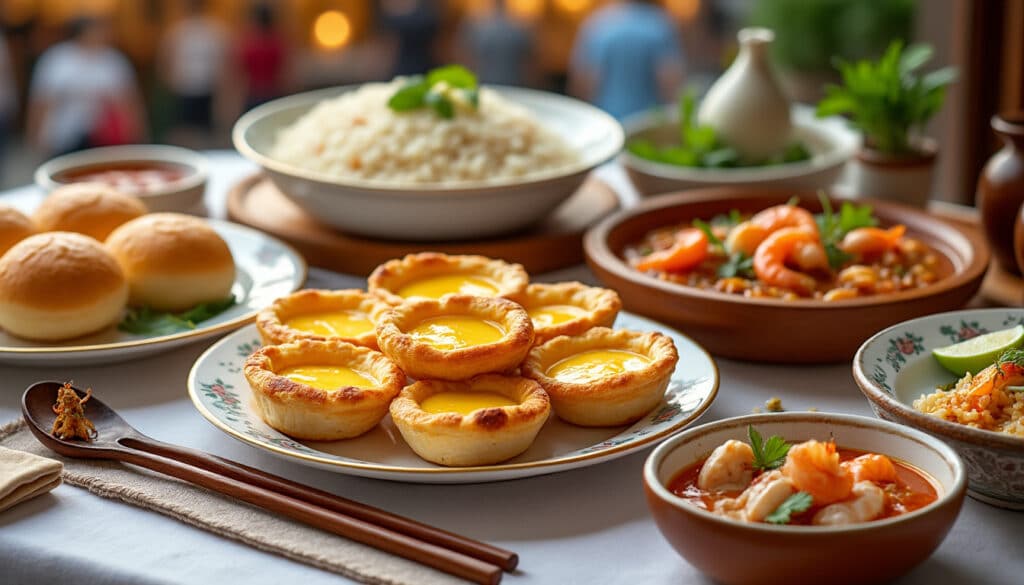
Macau, the enchanting peninsula on China’s western coast, is not just known for its lavish casinos and glittering skyline. The city stands as a culinary beacon, a meeting point where the wonders of Portuguese and Asian influences blend seamlessly to…
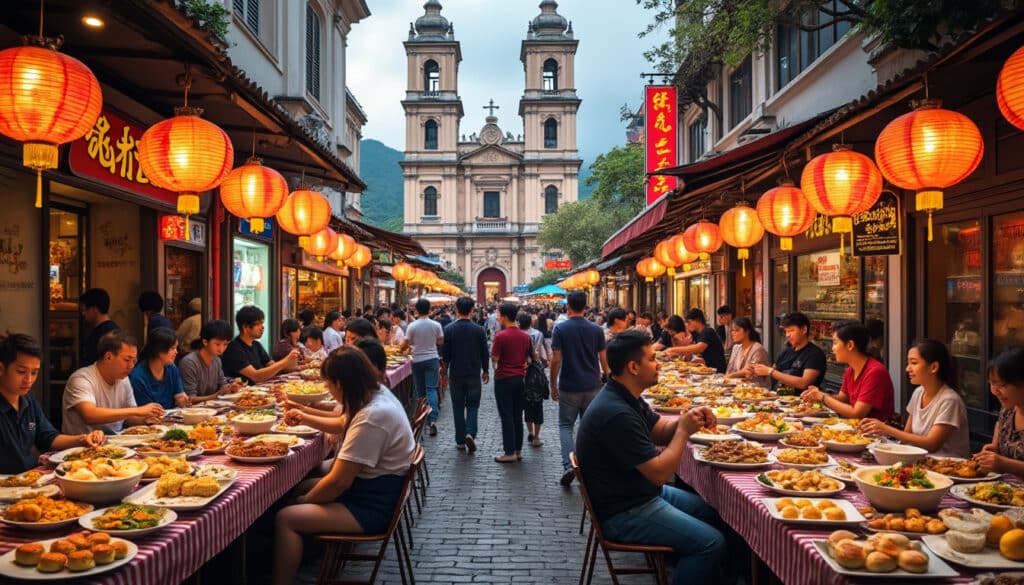
The vibrant streets of Macau come alive not only with the sounds of bustling casinos and awe-inspiring architecture but also with the enchanting aroma of its unique culinary offerings. As a confluence of cultures, particularly Portuguese and Chinese, Macanese cuisine…
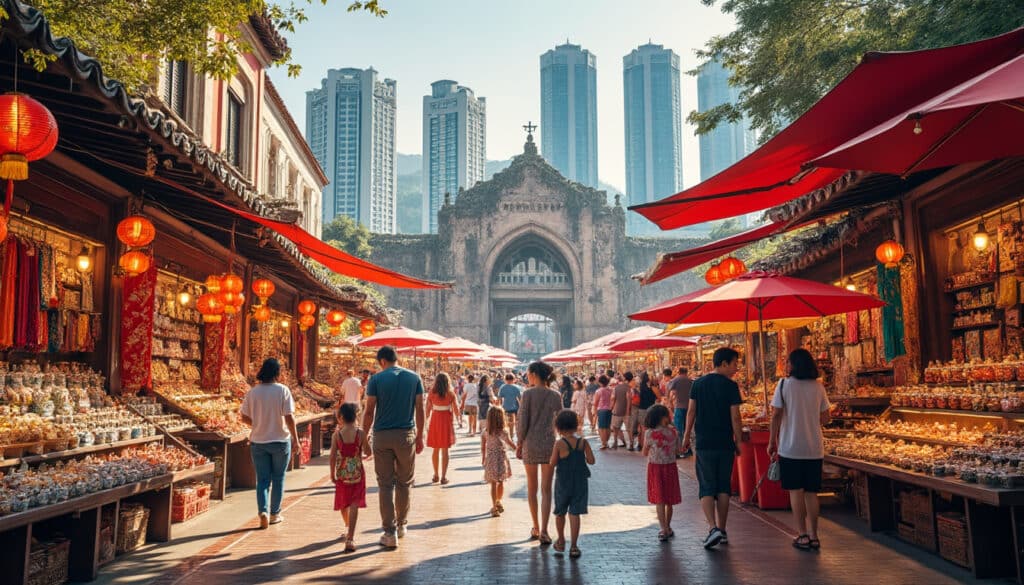
Souvenirs and shopping in Macau
Macau is a vibrant blend of Eastern and Western cultures, manifesting in its architecture, cuisine, and dynamic shopping ecosystem. As a shoppers’ paradise, Macau offers everything from luxury goods to unique souvenirs, thanks to its free port status. This small…

